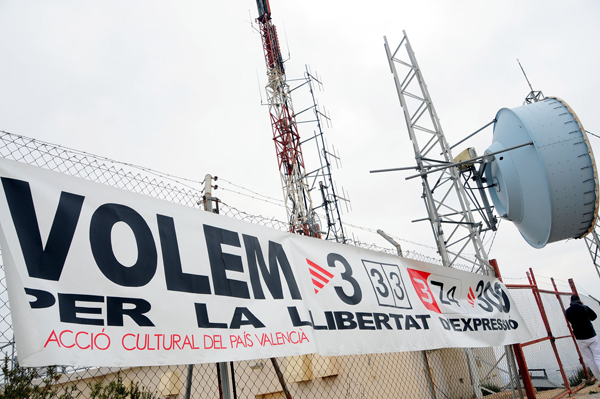22.01.2014 - 01:00
Wednesday at 8pm, Acció Cultural del País Valencià (ACPV) disconnected the antennae that have transmitted the signal of Catalunya Ràdio to Valencian dials for the last thirty-odd years. They did it reluctantly. A few hours earlier, the Spanish Government had sent the organization a letter threatening fines of a half million euros for the transmissions and also—for the first time—for the fact of having repeaters from which the radio waves were sent. The closure was instigated by a complaint from an extreme-right splinter group that had warned the Valencian Government about Catalunya Ràdio’s broadcasts. Given that it was a public broadcast, well-known and recognized by the Valencian Government, the complaint had little credence.
With this closure, the Valencian radio and television dials are completely bereft of broadcasts in their own language. In just three years, the legal actions undertaken by the various Valencian governments have forced the closure of all of the broadcasters that served the Valencian Country. Only a few local and county TV and radio stations remain. Both those that depend on the Valencian Government as well as those that depend on the Catalan Government have been shuttered.
TV3 was first
The first salvo in the offensive was against TV3 and the other TV stations that belong to the Barcelona-based Catalan Corporation for Audiovisual Media. It was spearheaded by the Valencian Government, who insisted that the transmissions were illegal despite the fact that they had been being watched normally all over Valencia since 1985. It must be noted that the Valencian Government has never persecuted any of the dozens of illegal broadcasters who transmit in Spanish and that can also be seen in Valencia.
After a long legal tug of war, on February 17, 2011, Acció Cultural del País Valencià was finally forced to turn off the repeaters that transferred the signal from Catalonia to Valencia, when the organization realized that the fines that had been repeatedly imposed by the Valencian Government might bankrupt them. The indignant reaction from the Valencian people could be seen with the Twitter hashtag ‘#sensesenyal’ [#nosignal] which was used in all manner of declarations and position papers of political parties, associations, institutions, and governments and also during a slew of demonstrations on the streets of Valencia’s principal cities.
There was also a popular ballot initiative ‘Television without borders’ which collected 650,650 accredited signatures. The initiative was presented to the Spanish Congress and was rejected, without negotiation, by the absolute majority of the PP.
Catalonia’s government, during the ‘tripartit’ era [a governing coalition between the Socialists, Republican Left and Eco-socialists], had proposed an alternate solution: a negotiation between the two Generalitats to transmit each others’ TV signals reciprocally all over each others’ territories. The negotiation didn’t go very far, despite the fact that Canal 9, Valencia’s TV station, could be watched in Catalonia during a short time. The Valencian Government made all sorts of excuses for delaying the signing of the agreement and finally the closure of Valencian public radio and TV (RTVV) signaled the end of any possibility of following that route.
The surprise closure of RTVV
Whoever thought the problem was that TV3 and Catalunya Ràdio were ‘Catalan’ broadcasters, got a rude awakening last November 29th. In an extremely controversial move, the Valencian government ordered the closure of all of RTVV, including Canal 9 and its other TV and radio stations.
The impact on Valencian society was enormous. First of all, because the Valencian Government had acted completely off the cuff and because of that, the stations were able to broadcast for almost a month without the political control that had smothered them for so long. And afterwards, because the final night was pathetic, with the police having to invade the facilities at Burjassot [the town where Canal 9 was located] to turn off the broadcast.
The political reaction to this closure was even more harsh, with President Fabra being screamed at no matter where he went. Meanwhile, all of the opposition parties have committed themselves to reopening the station once they are governing, and of negotiating the reciprocal deal with the Catalan Corporation of AV Media.
Last but not least, Catalunya Ràdio
Despite the still smoldering protests against the RTVV closure, the Spanish Government, spurred on by an unknown extreme-right group, forced ACPV to turn off its repeaters (that passed the signal from Catalonia south through Valencia). And Wednesday, at 8pm, the antennae were disconnected.
The closure is accompanied by a pair of fines in the amount of a half million euros each, for the transmissions and for the construction and possession of repeaters from which the signal was broadcast. These repeaters, financed by popular subscription during the eighties, are the property of Acció Cultural del País Valencià and in some cases belong to city governments of all stripes.
What is the situation today?
After this new blow, Valencia has two TV channels that cover the whole territory: Mediterráneo and Ehs, both of which broadcast wholly in Spanish.
Among the local stations, the vast majority broadcast in Spanish, although many of these have individual programs in Catalan. Levante TV in the city of Valencia, the Count TV in Xàtiva, Alcoi, Nord, TeleCastelló or Información TV who all broadcast a few Catalan shows in Alacant.



